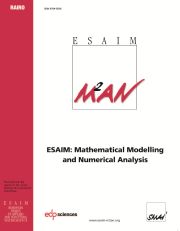Crossref Citations
This article has been cited by the following publications. This list is generated based on data provided by
Crossref.
Chen, Yanlai
Hesthaven, Jan S.
Maday, Yvon
and
Rodríguez, Jerónimo
2010.
Certified Reduced Basis Methods and Output Bounds for the Harmonic Maxwell's Equations.
SIAM Journal on Scientific Computing,
Vol. 32,
Issue. 2,
p.
970.
Benner, Peter
and
Heß, Martin
2012.
The Reduced Basis Method for Time‐Harmonic Maxwell's Equations.
PAMM,
Vol. 12,
Issue. 1,
p.
661.
Hesthaven, J. S.
Stamm, B.
and
Zhang, S.
2012.
Certified Reduced Basis Method for the Electric Field Integral Equation.
SIAM Journal on Scientific Computing,
Vol. 34,
Issue. 3,
p.
A1777.
Hess, Martin W.
and
Benner, Peter
2013.
Fast Evaluation of Time–Harmonic Maxwell's Equations Using the Reduced Basis Method.
IEEE Transactions on Microwave Theory and Techniques,
Vol. 61,
Issue. 6,
p.
2265.
Casenave, Fabien
Ern, Alexandre
and
Lelièvre, Tony
2014.
Accurate and online-efficient evaluation of thea posteriorierror bound in the reduced basis method.
ESAIM: Mathematical Modelling and Numerical Analysis,
Vol. 48,
Issue. 1,
p.
207.
W. Hess, Martin
and
Benner, Peter
2014.
A reduced basis method for microwave semiconductor devices with geometric variations.
COMPEL: The International Journal for Computation and Mathematics in Electrical and Electronic Engineering,
Vol. 33,
Issue. 4,
p.
1071.
Hesthaven, Jan S.
Stamm, Benjamin
and
Zhang, Shun
2014.
Efficient greedy algorithms for high-dimensional parameter spaces with applications to empirical interpolation and reduced basis methods.
ESAIM: Mathematical Modelling and Numerical Analysis,
Vol. 48,
Issue. 1,
p.
259.
Manzoni, Andrea
and
Negri, Federico
2015.
Heuristic strategies for the approximation of stability factors in quadratically nonlinear parametrized PDEs.
Advances in Computational Mathematics,
Vol. 41,
Issue. 5,
p.
1255.
Hess, Martin W.
Grundel, Sara
and
Benner, Peter
2015.
Estimating the Inf-Sup Constant in Reduced Basis Methods for Time-Harmonic Maxwell’s Equations.
IEEE Transactions on Microwave Theory and Techniques,
Vol. 63,
Issue. 11,
p.
3549.
Chen, Yanlai
2016.
A certified natural-norm successive constraint method for parametric inf–sup lower bounds.
Applied Numerical Mathematics,
Vol. 99,
Issue. ,
p.
98.
O'Connor, Robert
2016.
Bounding stability constants for affinely parameter-dependent operators.
Comptes Rendus. Mathématique,
Vol. 354,
Issue. 12,
p.
1236.
Chen, Yanlai
Gottlieb, Sigal
Heryudono, Alfa
and
Narayan, Akil
2016.
A Reduced Radial Basis Function Method for Partial Differential Equations on Irregular Domains.
Journal of Scientific Computing,
Vol. 66,
Issue. 1,
p.
67.
O’Connor, Robert
2016.
Lyapunov-Based Error Bounds for the Reduced-Basis Method.
IFAC-PapersOnLine,
Vol. 49,
Issue. 8,
p.
1.
Hesthaven, Jan S.
Rozza, Gianluigi
and
Stamm, Benjamin
2016.
Certified Reduced Basis Methods for Parametrized Partial Differential Equations.
p.
45.
Kirchner, Kristin
Urban, Karsten
and
Zeeb, Oliver
2016.
Maxwell’s equations for conductors with impedance boundary conditions: Discontinuous Galerkin and Reduced Basis Methods.
ESAIM: Mathematical Modelling and Numerical Analysis,
Vol. 50,
Issue. 6,
p.
1763.
Hesthaven, Jan S.
Rozza, Gianluigi
and
Stamm, Benjamin
2016.
Certified Reduced Basis Methods for Parametrized Partial Differential Equations.
p.
1.
O’Connor, Robert
and
Grepl, Martin
2017.
Model Reduction of Parametrized Systems.
Vol. 17,
Issue. ,
p.
121.
Kärcher, Mark
Tokoutsi, Zoi
Grepl, Martin A.
and
Veroy, Karen
2018.
Certified Reduced Basis Methods for Parametrized Elliptic Optimal Control Problems with Distributed Controls.
Journal of Scientific Computing,
Vol. 75,
Issue. 1,
p.
276.
Antil, Harbir
Chen, Yanlai
and
Narayan, Akil
2019.
Reduced Basis Methods for Fractional Laplace Equations via Extension.
SIAM Journal on Scientific Computing,
Vol. 41,
Issue. 6,
p.
A3552.
Hain, Stefan
Ohlberger, Mario
Radic, Mladjan
and
Urban, Karsten
2019.
A hierarchical a posteriori error estimator for the Reduced Basis Method.
Advances in Computational Mathematics,
Vol. 45,
Issue. 5-6,
p.
2191.




